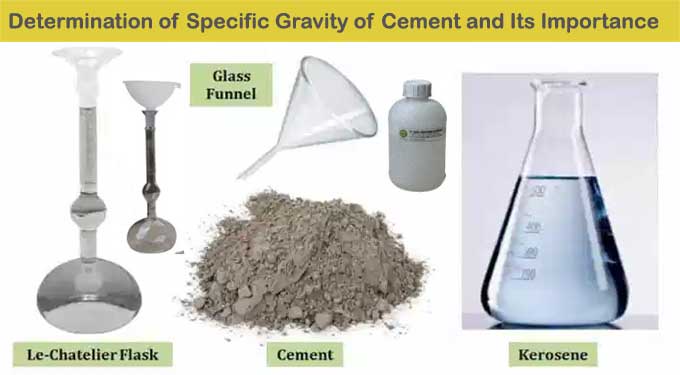
Specific Gravity of Cement Test

The specific gravity of a material is the ratio of one Weight of Volume of material with another Weight of Volume of water. Simply put, we are comparing our Testing material like sand, cement, or aggregate with water at a specified temperature, and the volume of each is the same.
Density of Cement Test
Cement?s Specific Gravity can be determined by Le Chatelier's Flask method, according to the principle of Le Chatelier.
You have to apply the principle of Le Chatelier to check the density, it is necessary to have the following equipment:
? Cement.
? Kerosene.
? This Specific Gravity Bottle comes with a stopper and has a 250 ml capacity.
? Weighing balance with 0.1 gm accurate.
Uses of Kerosene in Specific Gravity Test
Specific gravity is usually calculated using water. The specific gravity of cement can be determined with kerosene, however. Cembalin hydrates when reacting with water and forms calcium oxide. Mixing cement and kerosene won't produce any reactions.
Procedure of Finding Specific Gravity in Cement
1. To ensure the Le Chatelier flask is free from moisture, it must be thoroughly dried.
2. W1 is the weight of the empty flask.
3. In a flask, add 50 grams of cement. The flask should now weigh W2 with the stopper attached.
4. Adding kerosene to the sample until it reaches the neck of the bottle is the next step. The flask should not contain any air bubbles after mixing thoroughly. Please note the weight as W3.
5. The Flask should empty and the bottle filled with kerosene to the top, with the weight being W4.
Specific Gravity Cement Formula
Formula:-
Specific gravity of kerosene denotes as 0.79.
The specific gravity of the material must be calculated to understand its behavior in water. Specific gravity varies widely from 0.1 - 100 depending on the material. A material that floats in water has a specific gravity of less than 1. The material sinks if its specific gravity exceeds 1. Cement's density or specific gravity ranges between 3.1-3.16 g/cc, so cement is 3.16 times heavier than water and has the same volume.
A cement's strength and workability are compromised if it has a high moisture content. The Cement's specific gravity should be 3.15g/cc in Nominal Mix.
It is possible to find voids in all materials because they contain pores. As a result of adverse weather conditions, the specific gravity of cement may increase to 3.19 if exposed to high moisture contents. The cement pores fill with moisture based on their specific gravity of 3.19. When cement reacts with atmospheric moisture, a chemical reaction occurs.
This process is known as hydration. Cement is susceptible to moisture damage. After hydrating with water, cement is rendered useless. An excessive amount of moisture causes old cement to have a lot of lumps. IS specifies that cement should be re-tested if it has been older than three months.
Significance
Moisture content can influence the specific gravity of cement. Cement particles contain water because of their porous nature. Preparation of the nominal mix uses concrete that has a specific gravity of 3.16. It would affect the Mix design if the specific gravity changed.
A specific gravity test of the cement procured before use is vital in these circumstances mixing the ingredients. Cement old stocks are overlooked because of this reason.
The cement's external moisture content can affect its performance.
When the specific gravity exceeds 3.19, it indicates that the cement was improperly minced or ground. A chunk of cement indicates moisture.


